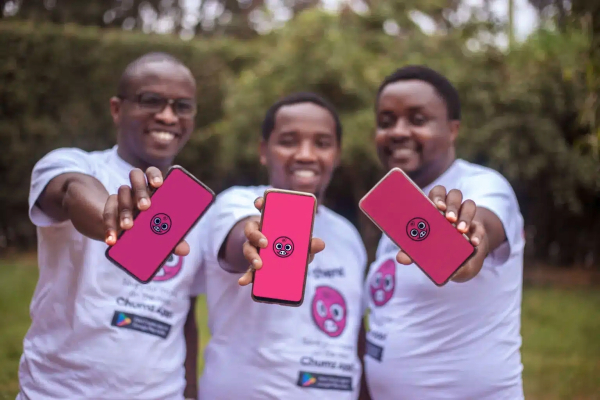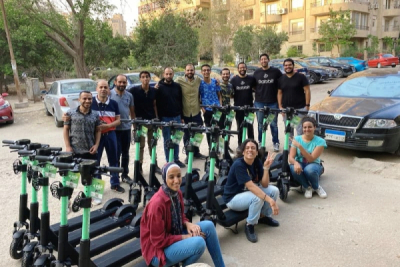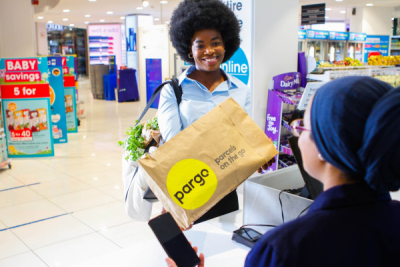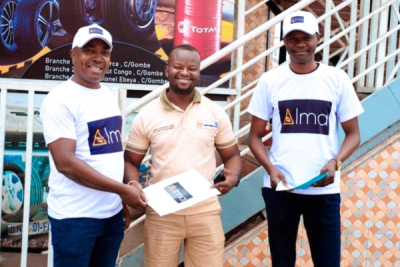
Solutions (583)
Born in Nairobi to help residents save money, it now plans to expand to several other countries in the coming months.
Chumz is a fintech solution developed by a Kenyan startup, enabling users to save and invest money. Founded in 2019 by Samuel Njuguna, this Nairobi-based startup offers a mobile app available on iOS and Android, which has already been downloaded over 100,000 times, according to Play Store data. After downloading the app, users can create an account to access Chumz's services, set personal or group savings and investment goals, and take action toward them as soon as possible.
The app allows users to add friends or family members to create joint savings or investment goals. Chumz enables users to save with as little as 5 Kenyan shillings (about $0.04). Through the app, users can track their savings progress and receive periodic reports on their financial growth. They are also reminded to save through behavior-based notifications and deposit prompts.
“For example, if a user spends money at a pub, the app suggests investing a portion of that money instead of spending it all. Similarly, when a user receives mobile money, the app prompts them to save some of it. Chumz provides an easy and convenient way for users to save and invest, helping them reach their financial goals,” explains Samuel Njuguna.
After surpassing 200,000 users, Chumz now eyes the Rwandan market, with Tanzania, Uganda, and Botswana also on its growth agenda in the coming months. By 2026, Chumz aims to reach one million users in Kenya, its home market.
Adoni Conrad Quenum
After graduating from several accelerator programs, the startup has firmly established itself in Morocco's logistics market. Now, with the backing of various investors, it plans to expand its operations beyond national borders.
Colis.ma is a logistics solution developed by a Moroccan startup, enabling both businesses and individuals to send and receive parcels across six European countries. Founded in 2022 by Issam Darui and based in Oujda, the startup recently raised $300,000 in an October funding round to fuel its growth.
The company plans to use the funds to expand its coverage in Morocco’s five largest regions and establish more connections between African and European countries, beginning with West Africa. Commenting on the funding, Darui stated, “This funding allows us to broaden our geographic coverage and further improve the quality of our services. [...] Our goal is to become a key player in logistics between Africa and Europe, offering innovative technological solutions to a sector undergoing transformation.”
Colis.ma offers a mobile app available on iOS and Android, where users can create accounts to access its services. Currently, the startup operates in France, Spain, Luxembourg, Belgium, Germany, and the Netherlands. The parcel shipping process involves selecting the sender and recipient locations, entering the recipient’s details, filling out shipping information, and choosing the service type. Users then receive a tracking number to monitor their parcel’s real-time status.
Since its launch, the startup has joined multiple accelerator programs, including Baobab Network, Plug and Play Morocco, and Orange Corners, through which it secured a $45,000 grant.
Adoni Conrad Quenum
Developed to ease urban mobility, the solution uses eco-friendly vehicles to support the fight against climate change.
Rabbit Mobility is a digital solution developed by an Egyptian startup that allows users to rent electric vehicles—including scooters, e-scooters, and bicycles—for urban travel. Founded in Cairo in 2020 by Kamal ElSoueni, Mohamed Mansoury, and Bassem Magued, the company has quickly made its mark in the micromobility space.
Earlier this month, Rabbit Mobility announced a successful $1.3 million funding round to fuel its growth and support expansion into additional North African markets. Speaking on the funding, Kamal ElSoueni said, “We are thrilled to welcome 500 Global, Untapped Global, and our esteemed angel investors to the Rabbit Mobility family. Their investment will enable us to accelerate our growth, expand our fleet, and enhance our user experience, making micromobility more accessible and convenient for Egyptians nationwide.”
The service operates through a mobile app available on iOS and Android, where it has been downloaded over 100,000 times according to Play Store statistics. After downloading, users create an account with their phone number and link a bank card via the “Wallet” menu. To start a trip, users locate a Rabbit Mobility vehicle, scan the QR code on the handlebar, and initiate the ride. At the destination, the vehicle automatically deactivates, and users must take a photo of the properly locked vehicle before ending the ride.
“The ride should automatically stop once the scooter stops working or loses connectivity. If it doesn’t, please end it yourself from the app and press on “Report an issue” explaining what happened and our operations team will investigate the issue. For the safety of others, please make sure to park the scooter responsibly and not to block any public pathways,” the startup advises.
Rabbit Mobility also offers daily and multi-day rentals, vehicle reservations, subscription systems, and friend referral rewards. Through the referral program, both the referrer and the referred friend receive 20 Egyptian pounds (about $0.41) after the friend’s first ride.
Adoni Conrad Quenum
With the digital transformation sweeping the continent, various tech sectors are experiencing rapid growth. E-commerce is one of these expanding sectors, driving a need for logistical solutions to streamline deliveries and other related services.
Pargo is a digital solution developed by a South African startup that connects shoppers to major online retailers and facilitates delivery services. Founded in 2015 by Lars Veul and Derk Hoekert and based in Cape Town, Pargo recently secured $4 million in funding to expand into Egypt.
Speaking on the expansion, Lars Veul stated, “Egypt is one of the most exciting e-commerce markets in Africa, and we are thrilled to bring our Collect and Returns services here. Our mission is simple: create an affordable ecommerce delivery solution to increase access to the 500 million online shoppers across Africa that e-commerce companies currently struggle to service.”
Pargo integrates seamlessly with online retail platforms via Shopify and WooCommerce plugins. It also offers an API for those who prefer direct integration.
Customers choosing Pargo at checkout can follow the delivery process by filling out a form with personal details and selecting a nearby pickup point for delivery. The startup has over 4,500 pickup locations in its main market, South Africa. Delivery typically takes up to three business days from the date Pargo collects the package, with an additional two days required for peripheral areas. Recipients have up to eight days to collect their parcels. Additionally, Pargo’s relay points allow users to send or receive packages, and an online account enables real-time delivery tracking.
Adoni Conrad Quenum
E-government services are rapidly expanding across the continent, with governments striving to improve user access. Tech entrepreneurs also see this as a growing opportunity.
Alma.cd is an e-governance solution developed by a Congolese startup, offering users the ability to order administrative documents online and receive them at their chosen address. The startup, founded by Synthia Tshimanga, is based in Kinshasa.
Currently, Alma.cd does not have a dedicated mobile app. Users must access the platform through a web browser. To use the service, individuals create an account with their personal information, select the "Order" button, and choose the specific document they need. Alma.cd offers services for a variety of documents, including birth certificates, marriage licenses, and certificates of good conduct.
After selecting the document, users can add it to their cart and confirm their order. They then need to provide any necessary information specific to the document, with mandatory fields clearly marked. Following this step, users proceed to the delivery section where they enter their identification and preferred delivery address.
The final steps involve agreeing to the platform's terms and conditions and making an online payment via mobile money. Once the order is confirmed, users simply wait for their documents to be delivered.
Alma.cd achieved recognition in 2023, winning the women's award at the Congolese stage of the Orange Social Entrepreneur Prize for Africa and the Middle East.
Adoni Conrad Quenum
The entertainment industry is thriving across the continent. Tech entrepreneurs are creating innovative digital solutions to streamline various aspects of event management, among other things.
Akwaaba is a digital solution developed by a Ghanaian startup that offers users venue recommendations, the ability to purchase event tickets online, and the chance to earn rewards by sharing the app and referring others.
Founded in 2012, it features an iOS and Android app, with the Android app boasting over a thousand downloads on the Play Store. Through those mobile apps, users can create their accounts to, among other things, make reservations at places like restaurants, cinemas, and fast-food outlets in the cities of Accra and Kumasi.
Event organizers and venue promoters can also leverage Akwaaba to sell tickets, manage bookings, and benefit from marketing support. To boost engagement, the startup has launched a rewards program aimed at "generating more user involvement and revenue for local businesses, helping them thrive in an increasingly competitive market."
Additionally, the startup has partnered with social media content creators to enhance its visibility. “By leveraging the power of social media, the Influencer Programme will engage a wider audience and increase app downloads, further solidifying Akwaaba’s position as the viable event platform in Ghana," explained Kingsley Kordie, Akwaaba’s director.
Adoni Conrad Quenum
The informal sector is highly developed in many countries across the continent. This solution was developed to support players active in that sector.
Waribei is a fintech solution developed by an Ivorian startup. It enables small merchants to procure stock directly from wholesalers and gives the latter access to bank credit. The startup, based in Abidjan, was founded in 2023 by Ladislas Pham and Frédéric Fameni.
Earlier this month, it announced the successful completion of a funding round, raising 750,000 euros (approximately $813,500) from Mstudio and Saviu Ventures. The funds will be used to expand its operations and support its growth.
“We spend time in the markets, understanding the daily challenges [businesses] face, to design solutions that truly meet their needs. At Waribei, we want to ensure that merchants can grow their businesses without worrying about maintaining stock levels or struggling to secure loans,” said Ladislas Pham.
The solution includes an Android app that allows users to create an account, check partner suppliers and benefit from the advantages offered. Each user is granted an advance amount to purchase stock. With a pre-generated QR code (waricode), the user can make purchases from a supplier partnered with Waribei.
The fintech acts as a link between banks, suppliers, and small merchants, with plans to expand into other francophone African countries.
Adoni Conrad Quenum
Specifically designed for children with mental issues, it allows 24/7 support with tools like mood journals.
Auzy Mental Health is a Tunisian e-health solution developed by a startup founded in 2021 by Abid Khouloud. The platform allows parents to diagnose and treat their children suffering from psychological, neurodevelopmental, and behavioral disorders.
To achieve this, the healthtech company offers personalized monitoring, online diagnostics, and 24/7 support, guiding parents from pregnancy and integrating tools such as a mood journal, progress tracking, and therapeutic exercises.
Unlike many solutions, Auzy Mental Health does not have a mobile app. Users access the platform directly through a web browser via its website. While users can create an account by providing personal information, this step is not necessary for browsing the platform.
The Tunisian startup also provides information on various conditions it addresses, including hyperactivity, intellectual disability, autism, and dyslexia. It offers online tests supported by artificial intelligence to assess children's health and provides advice for parents on managing these conditions or recognizing potential signs.
The process involves becoming informed, undergoing testing, and selecting a healthcare professional to support the child. “Our primary goal is to ensure that every child has the right to become an active member of society and access all decent means of living. We work to provide guidance, coordination, and an early intervention process for children with neurological developmental disorders,” explains the startup.
In September 2024, Auzy Mental Health was selected to represent Tunisia in the final phase of the Orange Social Entrepreneur Prize for Africa and the Middle East in the International Women’s Award category.
Adoni Conrad Quenum
Developed to assist fashion designers with the daily management of their businesses, it also includes an integrated online store.
ProCouture is a digital solution developed by an Ivorian startup. The company, founded by Adama Bakayoko, aims to help tailors, particularly those in the informal sector, better manage their workshops.
"Of all the tailors we’ve worked with, only a few know how much they earn each month. It’s important to have data, indicators. [...] The software allows you to check if the business is doing well," explains Adama Bakayoko.
The solution is available on iOS and Android, with over 500 downloads according to Play Store data. Users create an account to access the platform’s various features, which include appointment reminders, customer management, cash flow tracking, production management, and supplier coordination. A key benefit is that better management of their workshops could help tailors secure financing from financial institutions.
ProCouture also integrates an online store, enabling tailors to enter the ready-to-wear market via the mobile or web app. From a computer or smartphone, they can manage this online store along with their daily customer orders. Access to the platform’s features requires a subscription, costing 3,000 FCFA (about $5).
In 2024, the startup won second prize at the Ivorian stage of the Orange Social Entrepreneur Prize for Africa and the Middle East.
Adoni Conrad Quenum
Developed to simplify the ticketing process for events, the solution won the first prize of the NBA Africa’s Triple-Double accelerator program.
Tix Africa is a digital solution developed by the Nigerian startup Festival Coins, enabling users to purchase event tickets online with just a few clicks. Founded in 2019 by Folayemi Agusto, the Lagos-based startup raised an undisclosed amount in 2021 to support its growth.
Commenting on the funding round, Agusto stated, “The new capital will enable us to scale quicker and to integrate the currently separate products and services we offer, including an app offering event attendees a marketplace where they can buy, trade and resell tickets securely.”
Tix Africa offers a mobile app available on both iOS and Android, with over a thousand downloads according to Play Store data. Users can create an account and access various events on the platform, ranging from sports and wellness to arts, culture, spirituality, religion, music, and performances.
Event promoters can showcase their events on Tix Africa, with the ability to track ticket sales from a dashboard. “You can create events that repeat more than once within a specific period. Then, within a single checkout, attendees will be able to select the preferred date they’d like to attend your event. This feature allows you to manage single ticket pages for multiple events and make the same tickets available across multiple dates, thus saving you time and effort,” explains the startup.
Adoni Conrad Quenum
More...
Designed to help artisans reach a wider range of clients, it offers an Android app that enables those artisans to get their activities online.
Fundis is a digital solution developed by a Kenyan startup that connects users with professional artisans across various fields. Founded in 2019 by Liwali Kivumanyuki and Alex Ndegwa, the startup is based in Nairobi.
"Africa’s informal workforce is highly fragmented, characterized by low unpredictable earnings, poor working conditions, and low productivity. Beyond the fragmentation, many artisanal skills, knowledge, and competencies in use in Africa’s informal labor market have not been assessed, recognized, or certified, yet recruitment requires certification that the informal or non-formal market does not provide," explained Alex Ndegwa.
The mobile app, currently available only on Android, has been downloaded over a thousand times according to Play Store data. After downloading the app, users create an account to access its services. They can submit their requests through the app, which connects them with top professionals in their respective fields. Users can preview profiles and select the artisan for the job.
Once a selection is made, users can schedule an appointment for the work to be completed. Fundis offers professionals in plumbing, electrical work, carpentry, tiling, masonry, and home appliance repair. The startup aims to expand its services to other African countries, beginning with Tanzania, where it is already conducting trials for a full rollout by the end of 2024.
Adoni Conrad Quenum
Designed to improve smallholder farmers’ sales, it provides an online marketplace and delivery system to ensure efficiency. It also combat food waste through an aid program.
Fudlink is an agritech solution developed by a Namibian start-up, connecting farmers and buyers to logistics services through its web and mobile platforms. The start-up, based in Windhoek, was founded in 2021 by Twama Nghidinwa.
Fudlink has announced the official launch of its mobile app for Saturday, September 28. The app, available exclusively on Android, will feature all the functionalities of the web platform. "Our goal is to empower small farmers by giving them access to formal markets and building a logistics ecosystem that supports Namibia's agricultural sector," said Twama Nghidinwa.
Since its 2021 launch, the startup has operated primarily through its web platform, offering an online marketplace where small-scale farmers can register and sell their products. Fudlink has also implemented a delivery system. "Individuals and businesses with vehicles sign up as logistics service providers on our website, use their vehicles to deliver food, and are compensated for their services," Fudlink explains. This approach allows the company to create jobs and cover all regions of the country.
Moreover, Fudlink is committed to combating food waste. It has established a food aid program to redistribute surplus products that would otherwise be wasted or discarded to vulnerable communities and non-profit organizations.
Adoni Conrad Quenum
Developed to enhance youth education, the platform currently boasts more than 5, 000 users, with the goal to reach 20,000 in the next two years.
Farid is an e-learning platform targeting children aged 3 to 18. Developed by an Egyptian startup, it helps users build character, learn about human values, and maintain good mental health. The start-up was founded in 2024 by Mahmoud Hussein.
In September 2024, the company announced a successful $250,000 funding round, which will be used to enhance the platform and support its expansion in Saudi Arabia and the United Arab Emirates.
The platform does not have a mobile app, so users must access it through a web browser. After creating an account with their personal information, they can enroll in courses. Parents can choose which workshops their children attend. Notably, Farid offers "individual sessions that ensure direct and effective interaction with each child, allowing them to receive personalized attention and one-on-one guidance."
As children progress through the training, the startup sends detailed reports to parents, outlining their children’s grades and areas for improvement. Since its launch, Farid has hosted over 400 workshops, attracted more than 5,000 users, and partnered with over 700 certified trainers. In addition to courses for children, the platform also offers training for recent graduates to become instructors.
Adoni Conrad Quenum
Developed with the support of multiple technical partners, the solution assists parents in tracking their children's vaccination schedules.
Mangwele is a digital health solution developed by the United Nations Children’s Fund (UNICEF) to help parents keep track of their children's vaccination appointments from birth until the age of one. Launched in July 2023 with support from the Japanese government, the platform is designed to streamline the vaccination process.
“This project will allow healthcare workers to monitor birth registrations and track each child’s vaccinations by entering this information into a national database. The system enables individualized tracking to ensure all children receive the necessary vaccines, even if they relocate,” said Satoko Morito, First Secretary of the Japanese Embassy in Congo.
From the moment a child is born, midwives collect key information such as the child's name, the parents' details, and their phone numbers. Fifteen days before each vaccination date, Mangwele sends SMS reminders to parents, notifying them of the upcoming appointment. These dates are pre-set according to the Expanded Program on Immunization (EPI) calendar.
In addition to aiding parents, Mangwele helps healthcare professionals monitor birth registrations and track each child’s vaccinations, contributing to a national database. Currently available in Brazzaville and Pointe-Noire, authorities plan to expand the app’s use across the entire Congo in the coming months.
Adoni Conrad Quenum















